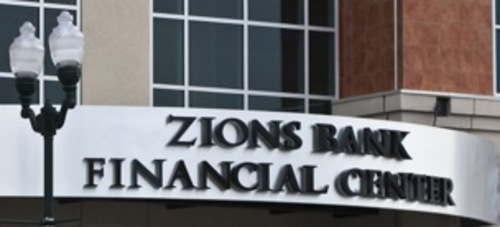This is an archived article that was published on sltrib.com in 2014, and information in the article may be outdated. It is provided only for personal research purposes and may not be reprinted.
Utah's Zions Bancorp was the only major U.S. financial institution to fall below the Federal Reserve's minimum capital level under its annual stress test, meaning the bank would not have enough capital to satisfy its loans under a severe economic downturn.
In the new results released last week, Zions had a 3.6 percent Tier 1 common ratio, which measures the high-quality capital as a share of risk-weighted assets or the overall health of the institution. The Federal Reserve has a minimum allowance of 5 percent.
Every year, the stress test looks at 30 U.S. financial institutions that have more than $50 billion assets to see how well they would perform in a simulated economic downturn.
Under the scenario, the economy would suffer a deep recession and a huge increase in the unemployment rate. Equity prices would drop nearly 50 percent, and house prices would drop to levels last seen in 2001.
"The annual stress test is one of the Federal Reserve's most important tools to gauge the resiliency of the financial sector and to help ensure that the largest firms have strong capital positions," Federal Reserve Governor Daniel K. Tarullo said in a statement.
While Zions had fallen below the feds' minimum allowance, the overall picture for the rest of the financial institutions looks good.
"The largest banking institutions in the United States are collectively better positioned to continue to lend to households and businesses and to meet their financial commitments in an extremely severe economic downturn than they were five years ago," the Federal Reserve said in a statement. "This result reflects continued broad improvement in their capital positions since the financial crisis."
Zions Bancorp Director of Investor Relations James Abbott, said the reason the bank fell below the minimum allowance is because nearly a fifth of its portfolio involves administering small business loans with real estate for collateral. Zions is second in the country in small-business-loan lending, according to the Small Business Administration.
Under the stress test, real estate prices would drop 35 percent, which impacts Zions because of those small business loans, he said.
"The composition of our company being a small business lender with real estate collateral had an adverse impact on us relative to other banks that have more residential mortgage exposure or more large-business exposure," he said.
Still, Abbott added that the bank had already taken action as a result of the test.
"We've already taken measures, and we will continue to take more measures to either reduce risk of our assets or issue common equity," he said. "But a combination of both of those actions will take place, and we expect to rise above the 5 percent threshold within the next few weeks or months."
Twitter: @ohmytech



